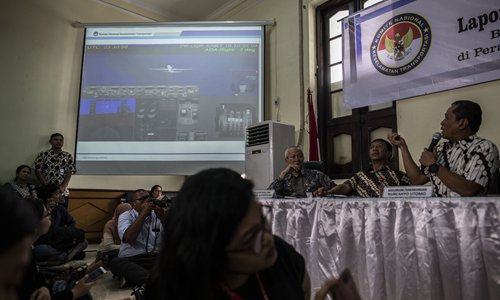HOME >> WORLD
Boeing design flaw, training factors in Lion Air crash
Source:AFP Published: 2019/10/25 22:03:40
Crash throws spotlight on 737 MAX’s mechanism

Photo: IC
A design flaw, inadequate pilot training and poor flight crew performance contributed to a Boeing jet crashing in Indonesia last year, killing all 189 people on board, investigators said Friday, in what one aviation analyst called a "damning" report.The Lion Air disaster was followed months later by a second crash - involving the same model of aircraft - when an Ethiopian Airlines plane went down with 157 people aboard, leading to the global grounding of Boeing's entire 737 MAX fleet.
The crashes threw a spotlight on the MAX model's Manoeuvring Characteristics Augmentation System (MCAS), an anti-stall mechanism that pilots in both planes had struggled to control as the jets careered downwards.
On Friday, Indonesia's National Transportation Safety Committee said Boeing's design of the anti-stall system and its certification by US regulators was "inadequate."
The MCAS was vulnerable to a single sensor that it relied on for inputs, and 737 MAX pilots were not properly briefed on how to handle a malfunction, it said in its final report on the crash.
"The aircraft flight manual and flight crew training did not include information about MCAS," it said.
A sensor on the doomed jet's system was "miscalibrated" and the problem wasn't caught by Lion Air maintenance crews, it said, after the plane's previous flight also experienced loss-of-control problems.
The emergency was not "effectively managed" by the crew, who had previous performance issues, it added.
An earlier report released by international regulators said the US Federal Aviation Administration (FAA) lacked the manpower and expertise to fully evaluate the jet's MCAS when it certified the plane.
Friday's report comes after Boeing - facing scores of lawsuits - replaced the chief of its commercial plane division this week, the most significant executive departure since the 737 MAX grounding plunged it into crisis seven months ago.
Boeing has faced fresh scrutiny following the revelation of text messages from 2016 in which a test pilot described the MCAS during a simulation as "running rampant" and behaving in an "egregious" manner.
On Friday, Boeing expressed "heartfelt condolences" to victims' families, and said it had since fixed the flight-control system's software.
"These software changes will prevent the flight control conditions that occurred in this accident from ever happening again," Boeing CEO Dennis Muilenburg said in a statement.
RELATED ARTICLES:
Posted in: ASIA-PACIFIC